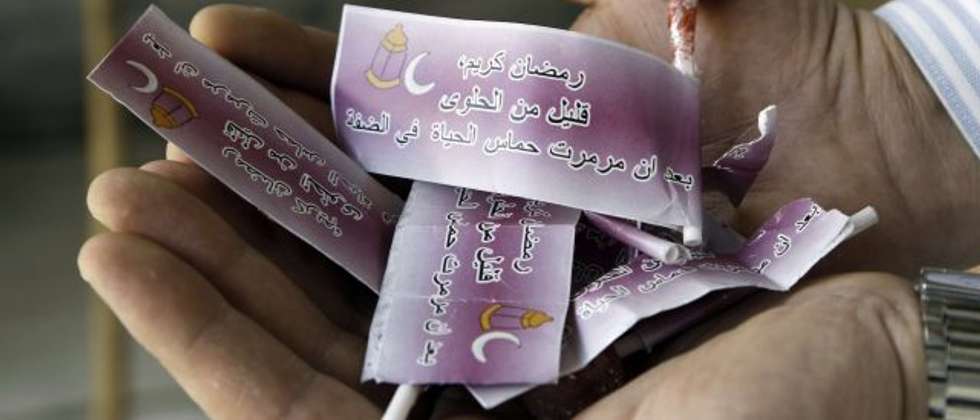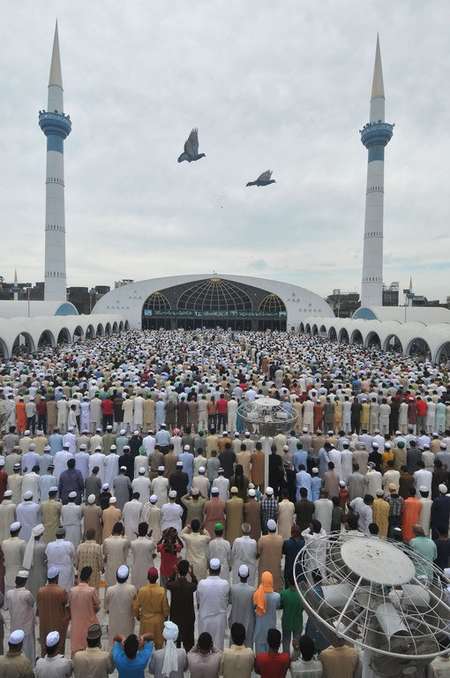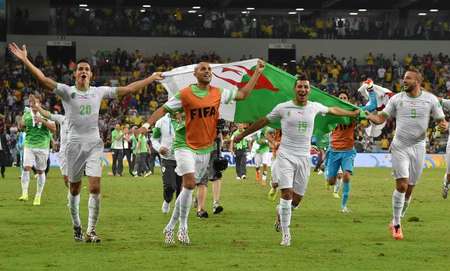Israel’s note attached to the candy reads, “Ramadan Kareem. Here are some sweets because Hamas is making life bitter in the West Bank.”
By i24news
The Israeli army handed out lollipops and matchboxes with anti-Hamas messages written on them to Palestinians as they continued their search for the three missing Israeli teens, Palestinian media reported Sunday.

Lollipops in the West Bank with the slogan ‘Here are some sweets because Hamas is making life bitter in the West Bank’ – Photo: AFP
“Ramadan Kareem. Here are some sweets because Hamas is making life bitter in the West Bank,” the note reads. An Israeli Defense Forces (IDF) spokesperson denied any knowledge of the campaign.
Earlier in the week, matchboxes were distributed with the phrase “Warning, Hamas is setting the West Bank alight” inscribed on them. According to photos taken by Palestinians, the matchboxes were produced by Swedish company Swedish Match.
Muslim holy month of Ramadan begins
Sunday marks the beginning of the Ramadan – Muslims’ holy month of fasting, during which 1.6 billion Muslims abstain from food and drink from sunrise until sunset. Ramadan ends with the Eid holiday.

Pakistani Muslims offer Jummat-ul-Vida, last Friday, prayers during the holy month of Ramadan, in Lahore, August 2, 2013 – Photo: Arif Ali – AFP/File
Ramadan, which is meant to be a time of reflection, worship and charity, is ironically known as one of the most violent months of the year across the Muslim world since many radical Islamist groups take advantage of the unique spiritual state of mind of the worshippers, and their obvious physical frailty, to execute terror attacks, believed by them to be blessed and rewarded by god especially on that holy month.
This year’s Ramadan comes at a time of heightened tensions and increased violence dominating countries from the Middle East’s Syria and Iraq, Asia’s Afghanistan and Pakistan to Africa’s Egypt and Nigeria, as extreme Islamist forces, such as the Islamic State in Iraq and the Levant (ISIL) and Boko Haram escalate their widespread offensive, or jihad war, in order to bring the world the gospel according to sharia.
US President Barack Obama greeted Friday Muslims across the world on the occasion of the holy month of Ramadan.
“A time for self-reflection and devotion through prayer and fasting, Ramadan is also an occasion when Muslims around the world reaffirm their commitment to helping the less fortunate, including those struggling because of economic hardship and inequality,” Obama said in a statement.
“At a moment when too many people around the world continue to suffer from senseless conflict and violence, this sacred time reminds us of our common obligations to pursue justice and peace and to uphold the dignity of every human being,” Obama added.
World Cup poses challenge to Muslim players

Front L-R: Algeria’s defender Aissa Mandi, defender Madjid Bougherra, midfielder Saphir Taider and forward Nabil Ghilas celebrate at the end of their Group H football match against Russia at the Baixada Arena in Curitiba on June 26, 2014 – Photo: Kirill Kudryavtsev /AFP
This year’s holy season also presents a unique dilemma for Muslim players in the World Cup, as choosing to fast will affect the strict diets they usually have to follow.
Germany, France, Belgium, and Switzerland all have Muslim players and have made it to the knockout stages of the World Cup. Algeria, a Muslim-majority country, and Nigeria, where half the country is Muslim, are also advancing.
Some players may choose to forgo fasting.
Mesut Özil, who plays midfield for Germany, has already decided that he will not be observing. “I am working and I am going to continue doing so. So I’m not going to do Ramadan,” he explained. “It’s impossible for me to do it this year.”
The majority of Algeria’s players, however, have already planned to fast, despite the dangers it could pose to their health.
Yaya Toure, a Muslim midfielder for the eliminated Ivory Coast team, was quoted in a United Arab Emirates newspaper as saying he would not consider fasting, if his team advanced.
“Fasting? Have you seen the weather?” Toure told The National. “I would die.”
The biggest concern, Heather Gillespie, a sports medicine physician at the University of California Los Angeles, said to NBC News, is dehydration. “That can lead to heat illness and heat stroke.”
Jiri Dvorak, FIFA’s chief medical officer, told a media briefing this week that players observing the fast should not suffer any deterioration in their physical condition.
“We have made extensive studies of players during Ramadan, and the conclusion was that if Ramadan is followed appropriately, there will be no reduction in the physical performances of players,” Dvorak told reporters.
Madjid Bougherra, a veteran player and captain of Algeria’s national team, said everything depends on his physical well-being.
“The hardest is staying hydrated. But it’s okay, the weather is good. Some players postpone [Ramadan]. Personally, I’m going to see what my physical state is, but I think I can do it,” Bougherra said.
During Ramadan last year, Kolo Touré, a defender for Côte d’Ivoire who is Muslim, explained that “The first five days are difficult. After that, the body just starts to adapt.”
View original i24news publication at: http://www.i24news.tv/en/news/international/35776-140629-to-fast-or-to-play-that-is-the-question







 Israeli New Shekel Exchange Rate
Israeli New Shekel Exchange Rate